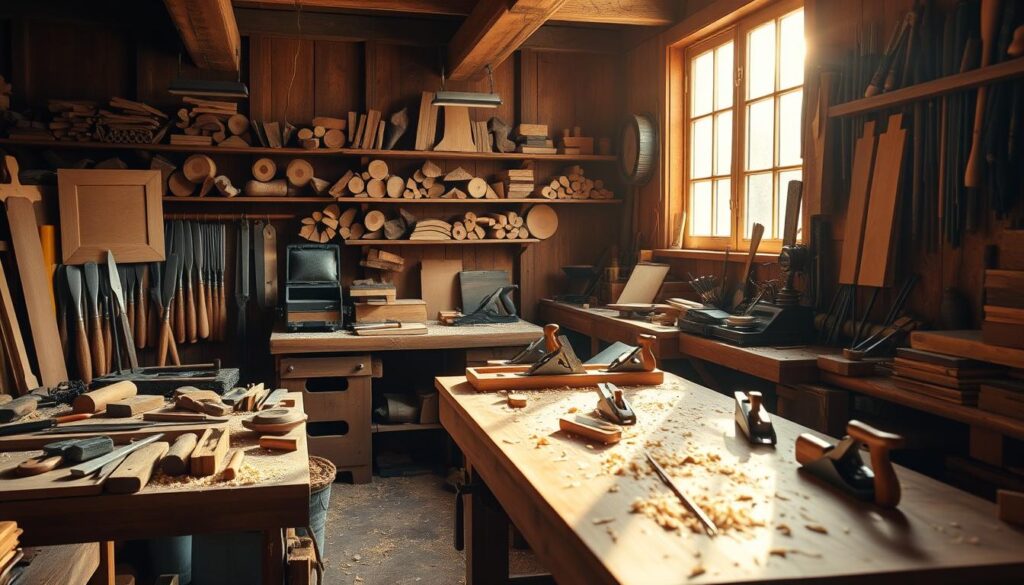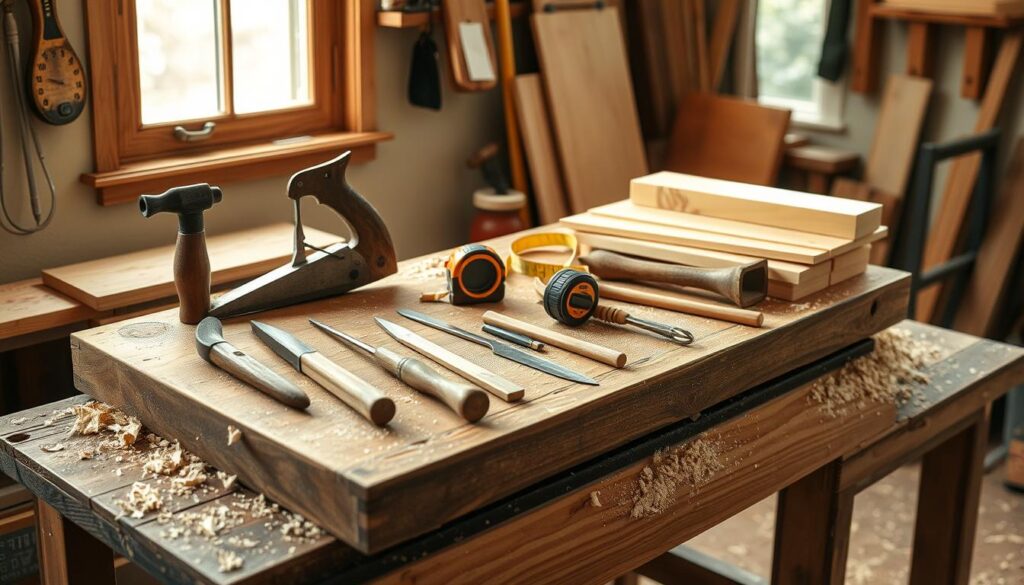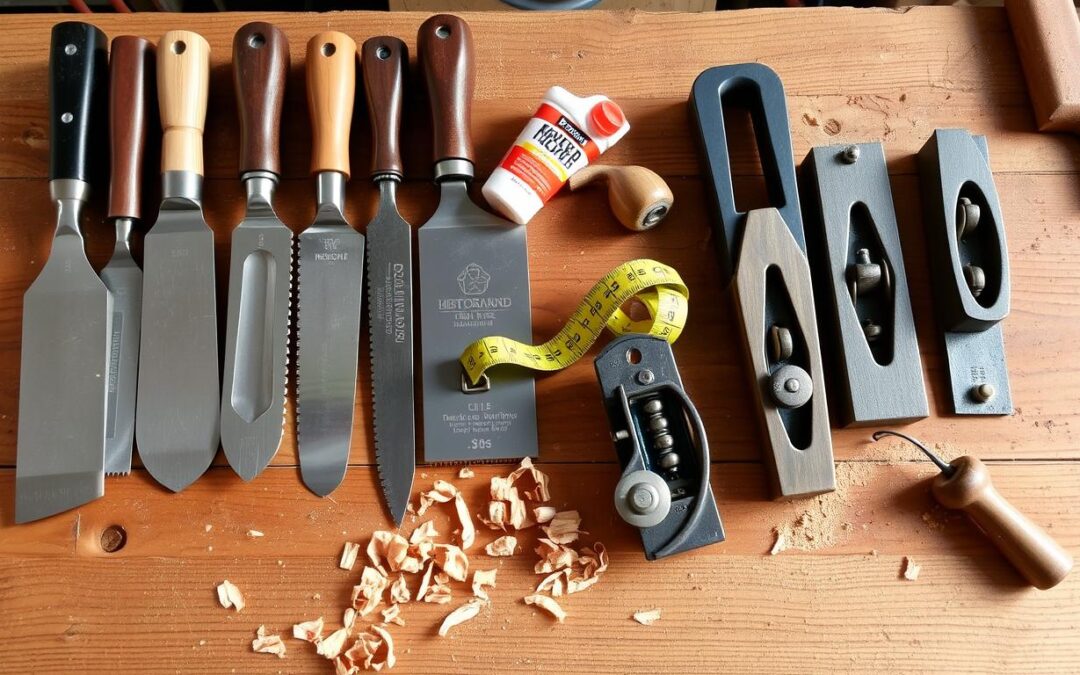Welcome to the world of woodworking, where the right tools are key to making masterpieces. As a woodworker, you know that creating exceptional pieces starts with the right equipment and techniques. This guide is here to help, offering expert advice on the essential tools to improve your skills and make your workshop a creative hub.
Woodworking is both an art and a science, needing passion and precision. Whether you’re experienced or just starting, this Woodworker’s Review will give you the knowledge to choose the right tools. Every tool in your workshop is important for shaping your woodworking craftsmanship.
In the following pages, you’ll explore the world of woodworking tools. You’ll see the latest innovations, classic tools, and affordable options that can take your projects to new levels. You’ll learn how to pick the right tools, keep them in top shape, and use them in your woodworking process.
So, let’s start and find the trusted tools that will help you create your success, one masterpiece at a time.
Introduction to Woodworking Tools
Woodworking is a craft that needs the right tools to get the job done. You’ll need everything from small hand tools to big power tools. The woodworking tools you choose can really make a difference in your projects. As a Woodworker’s Review, we’re here to help you pick the best tools for your woodworking needs.
The Importance of Quality Tools
It’s important to invest in high-quality woodworking tools for your projects. Good tools work better and make your work look better too. Cheap tools can mess up your projects, make you frustrated, and even be unsafe. So, it’s better to spend a bit more on quality tools for a better woodworking experience.
How to Choose the Right Tools
Finding the right woodworking tools can be hard, especially if you’re new. Here are some things to think about when picking tools:
- Purpose and Functionality: Know what you need to do and pick tools that can do it well.
- Material and Construction: Choose tools made from strong materials that can handle your woodworking materials.
- Ergonomics and Comfort: Pick tools that feel good in your hands and let you control them well.
- Reputation and Reviews: Look for well-known Woodworker’s Review brands and read online reviews to make a smart choice.
Thinking about these things will help you build a good toolkit. This will help you do better in your woodworking projects.
Essential Hand Tools for Woodworkers
Woodworking needs the right tools for precise work. Saws, chisels, and measuring tools are key. They help you complete any woodworking project.
Saws and Their Uses
Saws are crucial for woodworking. They help you cut and shape wood accurately. Here are some important saw types:
- Backsaw – Great for straight cuts and miters.
- Coping Saw – Perfect for curved cuts and small openings.
- Handsaw – Good for ripping and crosscutting big wood pieces.
- Japanese Saw – Has a thin blade for precise control.
Chisels: Types and Applications
Chisels are vital for shaping and cleaning up wood. Here are some common types:
- Bench Chisels – Useful for many tasks, from paring to mortising.
- Corner Chisels – Great for tight corners and small spaces.
- Carving Chisels – Have curved blades for detailed work and sculpting.
Measuring and Marking Tools
Accuracy is crucial in woodworking. You need the right tools for measuring and marking. Here are some essentials:
- Ruler – For basic length measurements.
- Combination Square – For marking and measuring angles and square edges.
- Marking Knife – For precise lines and outlines.
- Pencil – For quick sketches and planning.
Learning to use these tools will help you master many woodworking techniques. With the right tools, your woodworking projects can be amazing.
Power Tools Every Woodworker Needs
Having the right power tools is key to success in woodworking. You’ll need efficient electric saws, versatile routers, and sanders for a smooth finish. These tools are essential for any woodworking workshop.
The Benefits of Electric Saws
Electric saws, like circular and jigsaws, are faster and more precise than manual saws. They make clean cuts easily, saving time and reducing mistakes. They’re perfect for both big lumber and small trim work.
Router Types and Their Features
Routers are vital for woodworking tools. They’re used for shaping edges and creating decorative profiles. There are many types of routers, each with special features. Choosing the right one can improve your project’s quality and efficiency.
Sanding Tools for a Smooth Finish
Sanding tools are crucial for a flawless finish. Power sanders, like belt and orbital sanders, make sanding faster and easier. They help achieve a professional look. High-quality sanding tools can greatly improve your Woodworker’s Review projects.
Adding these power tools to your collection will make your woodworking projects better. You’ll work more efficiently and achieve a polished finish. Look for the best tools to enhance your woodworking skills and projects.
Specialty Tools for Advanced Projects
Woodworkers aiming for excellence need specialty tools. These tools open up advanced techniques and allow for detailed projects. They require precision and finesse. Here are some key tools every serious woodworker should have.
In-depth Look at Doweling Jigs
Doweling jigs are crucial for making strong, precise joints. They guide the drill bit for perfect hole placement. This makes dowel insertions seamless.
Woodworkers use them for panel joining, box assembly, and sturdy furniture frames. The adjustable settings and measurement guides ensure a professional finish.
The Role of Jointers and Planers
Jointers and planers are key for flat, smooth surfaces. Jointers straighten edges, and planers level faces for uniform thickness. These tools are vital for preparing wood for detailed joinery and cabinetry.
Mastering these tools can greatly improve your woodworking skills. They help in achieving professional-grade results.
Unique Hand Tools for Craftsmanship
Power tools are great, but hand tools offer unmatched control and precision. Carving chisels, specialty knives, and hand planes are examples. These tools allow for intricate details and organic shapes.
High-quality hand tools can transform ambitious projects. They add a level of craftsmanship that machines can’t match.
Adding specialty tools to your collection opens up new possibilities. They help you tackle complex projects with precision and skill. Whether it’s custom furniture, woodcarvings, or advanced joinery, the right tools make your vision a reality.
Safety Gear and Best Practices
Woodworking is a rewarding hobby, but safety comes first. As a woodworker, your safety is key. With the right safety gear and practices, you can enjoy woodworking safely.
Essential Safety Equipment
Protective gear is the base of woodworking safety. Make sure you have these essential items:
- Eye protection – Safety glasses or goggles protect your eyes from debris and sawdust.
- Hearing protection – Earplugs or ear muffs are vital for loud power tools.
- Respiratory protection – A dust mask or respirator keeps wood particles out of your lungs.
- Sturdy footwear – Wear heavy-duty, slip-resistant boots or shoes for your feet.
- Gloves – Cut-resistant gloves protect your hands from sharp tools and rough materials.
Woodworking Environment Safety Tips
A safe workspace is just as important as safety gear. Follow these tips for a safe woodworking area:
- Good ventilation helps keep dust and fumes away.
- Keep your workspace clean and organized to avoid tripping.
- Secure loose clothing, long hair, and jewelry to prevent accidents.
- Always unplug tools when not in use and never leave them running.
- Learn about each tool’s safety features and how to use them.
Putting safety first in woodworking lets you enjoy the craft fully. A safe workshop is essential for creating beautiful projects.
Tool Maintenance and Care
Keeping your woodworking tools in good shape is key. Regular cleaning and maintenance help them last longer and work better. This way, you can focus on your projects without worry.
Cleaning Your Tools Effectively
Start by cleaning your woodworking tools right after use. Wipe off dust, debris, and any leftover material. For a deeper clean, use a soft cloth and mild soap.
Don’t forget to clean the blades and moving parts. This keeps them running smoothly and prevents damage.
Regular Maintenance Routines
- Sharpen your cutting tools, like chisels and saws, regularly. This keeps them sharp and efficient.
- Use light oil or tool lubricant on moving parts. This reduces friction and wear.
- Check for loose screws or bolts and tighten them. This keeps your tools stable.
- Store your woodworking tools in a dry place. This prevents rust and damage.
By sticking to these maintenance tips, your woodworking tools will last longer. The Woodworker’s Review team suggests setting aside time each week or month for tool care. This keeps them ready for your woodworking projects.

| Tool Maintenance Task | Frequency |
|---|---|
| Wiping down tools | After each use |
| Sharpening cutting tools | Every few weeks or as needed |
| Lubricating moving parts | Monthly or as needed |
| Checking for loose hardware | Monthly |
| Storing tools in a dry environment | Continuous |
Reviews of Popular Woodworking Brands
Choosing the right tools is crucial in woodworking. Festool, DeWalt, and Makita are top brands. Let’s explore what makes them stand out.
Festool: Innovations and Reliability
Festool is a German brand known for its innovative tools. They offer a variety of saws, sanders, and routers. Their tools are famous for quality, advanced features, and ease of use.
DeWalt Tools: A Comprehensive Overview
DeWalt is a trusted American brand in woodworking. They have a wide range of tools, from drills to planers. DeWalt focuses on durability, performance, and safety, appealing to both hobbyists and professionals.
Makita: Performance and Durability
Makita is a Japanese brand loved for its performance and durability. Their tools, like circular saws and impact drivers, are known for quality and long battery life. Makita tools are built to last, offering reliable results for professionals.
| Brand | Standout Features | Target Audience |
|---|---|---|
| Festool | Precision engineering, advanced features, intuitive design | Professional woodworkers |
| DeWalt | Durability, performance, safety | Both hobbyists and professionals |
| Makita | Exceptional build quality, powerful motors, long-lasting battery life | Professional woodworkers |
The Woodworker’s Review offers detailed insights into these brands. It helps you choose the best woodworking tools and woodworking machinery for your projects.
Budget-Friendly Options for Beginners
Starting in woodworking can feel expensive with all the woodworking tools out there. But, you can create a starter kit without spending too much. We’ll show you how to find affordable tools and set up a budget-friendly workshop.
Affordable Alternatives to Premium Tools
Premium woodworking tools are top-notch but pricey for beginners. Luckily, there are cheaper options that work well. Here are some alternatives:
- Hand tools: Look for entry-level saws, chisels, and measuring devices from brands like Stanley or Irwin. They might not have all the bells and whistles, but they’re great for starting out.
- Power tools: Check out cordless power tools from RYOBI or SKIL. They’re cheaper than professional tools but still get the job done for DIY projects.
- Specialty tools: Think about buying used doweling jigs, jointers, and planers. You can find good deals on these tools if you look hard enough.
Building a Starter Kit on a Budget
Building a woodworking tools kit doesn’t have to cost a lot. Here are some tips to help you:
- Make a list of essential tools: Start with the basics like a hand saw, chisel set, hammer, and measuring tools.
- Prioritize your purchases: Get the most important tools first. Then, add more as you get better and can afford it.
- Look for sales and discounts: Watch for sales, clearance, and special deals to stretch your budget.
- Consider secondhand options: Check online and local sales for used woodworking tools. They can save you a lot of money.
- Invest in versatile tools: Pick tools that can do more than one thing, like a combination square or a multi-purpose power tool.
By using these budget-friendly tips, you can build a solid Woodworker’s Review starter kit. Start your woodworking journey without spending too much.

The Role of Online Communities
In the world of woodworking, online communities are very important. They help woodworkers connect and learn from each other. The Woodworker’s Review talks about how these communities are changing woodworking.
Connecting with Fellow Woodworkers
The internet has changed how woodworkers connect. Online forums, social media, and woodworking sites are where people share ideas. These places are great for both new and experienced woodworkers to ask questions and get inspiration for their woodworking projects.
Learning from Experts and Enthusiasts
Online woodworking communities are great for learning. They are filled with experts who want to share their knowledge. You can find videos and detailed discussions that help woodworkers improve their skills and tackle tough Woodworker’s Review projects.
By joining these online communities, woodworkers can find lots of resources and support. They can get help, work on projects together, or just meet others who love woodworking. The online world is full of chances for woodworkers to grow and do well.
The Future of Woodworking Tools
The woodworking world is changing fast. New tools and materials are coming out. These changes will make woodworking even more exciting.
Emerging Technologies in Woodworking
New tech is changing woodworking. Tools like CNC routers and laser cutters are now available. They make projects more precise and customizable.
Augmented reality (AR) and virtual reality (VR) are also becoming popular. They let woodworkers see their projects before they start. This helps them make better choices.
Trends in Sustainable Materials
Woodworking is going green. People are using eco-friendly materials like reclaimed wood and bamboo. These choices are good for the planet and add character to projects.
New wood composites and engineered wood are also popular. They are durable and look natural. This makes woodworking projects last longer and be better for the environment.
The woodworking world is looking forward to these changes. It’s clear that woodworking will get even better. Woodworkers will make amazing, eco-friendly projects.
Conclusion: Crafting Your Success with the Right Tools
Starting your woodworking journey means choosing the right tools is crucial. We’ve looked at many hand tools, power tools, and special equipment. These can make your woodworking projects truly stand out.
Recap of Key Points
Important tools like saws, chisels, and measuring tools are essential. So are advanced tools like routers, sanders, and jointers. Learning to use and keep these tools in top shape is vital for your growth as a woodworker.
Encouragement for Aspiring Woodworkers
Whether you’re experienced or just starting, the world of woodworking tools is full of opportunities. With hard work, a desire to learn, and the right Woodworker’s Review, you can turn your workshop into a place of creativity. Here, you can make amazing things with your own hands.
FAQ
What are the most important hand tools for woodworkers?
Woodworkers need saws, chisels, and tools for measuring and marking. Saws cut wood, like hand saws and dovetail saws. Chisels shape and join wood. Tools like rulers and squares ensure your work is precise.
What are the benefits of using power tools in woodworking?
Power tools like electric saws and sanders make woodworking faster and better. They help you do more complex tasks and achieve smoother finishes. This leads to better craftsmanship in your projects.
How can I ensure safety in my woodworking workshop?
Safety is key in your workshop. Wear eye, ear protection, and gloves. Keep your space clean and organized. Learn how to use and maintain your tools to avoid accidents.
How can I find affordable woodworking tools as a beginner?
You can find affordable tools without losing quality. Look for entry-level models or used tools in good shape. Starting with a budget kit can help you begin woodworking without spending too much.
How can I connect with other woodworkers and learn from experts?
Join online woodworking communities to meet others and learn from experts. Post your projects, ask questions, and follow professional woodworkers on social media. This way, you can share and gain from others’ experiences.
What are some emerging trends and technologies in the woodworking industry?
Woodworking is always changing with new tools and materials. Look out for advanced power tools, CAD software, and eco-friendly materials. These trends make woodworking more efficient and sustainable.

